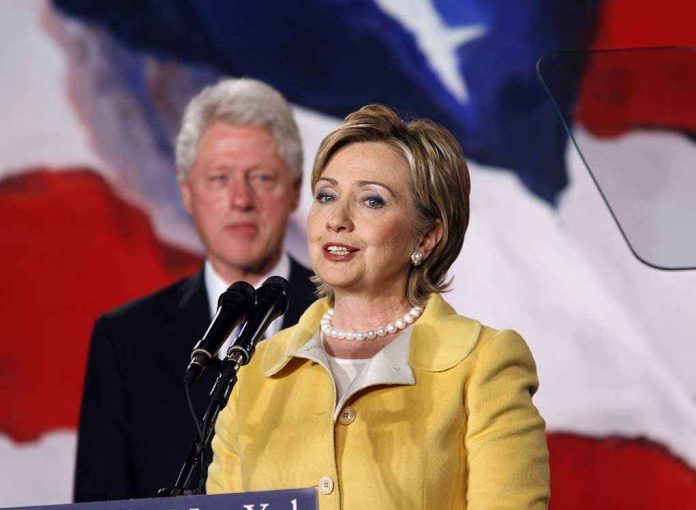
Subpoenas for Bill and Hillary Clinton in the Epstein probe signal a rare bipartisan push to demand answers from political elites and expose failures in government oversight.
Story Snapshot
- The House Oversight Committee has ordered Bill and Hillary Clinton to testify in person about their ties to Jeffrey Epstein and federal handling of his case.
- Both Republicans and Democrats support these subpoenas, underscoring bipartisan demands for accountability.
- The investigation extends beyond the Clintons, targeting former Attorneys General, FBI Directors, and Department of Justice records.
- No criminal allegations are made against the Clintons, but their testimony is seen as critical for transparency and legislative reform.
Congress Demands Accountability in Epstein Case
The House Committee on Oversight and Government Reform, now operating under renewed authority, has issued subpoenas requiring former President Bill Clinton and former Secretary of State Hillary Clinton to appear for in-person depositions.
The committee, chaired by Rep. James Comer (R-Ky.), is probing the federal government’s conduct in the Jeffrey Epstein case, specifically examining the Clintons’ knowledge of Epstein and Ghislaine Maxwell’s activities, as well as the effectiveness of federal prosecutions and anti-trafficking efforts. This move reflects widespread frustration with years of perceived stonewalling and elite protection.
The committee’s actions mark a significant step for legislative oversight. On July 23, 2025, the committee approved motions to subpoena not only the Clintons, but also former Attorneys General, FBI Directors, and Department of Justice officials.
Subpoenas were formally issued in August, with the Clintons’ depositions scheduled for December 17 and 18, 2025. These developments follow months of negotiation with the Clintons’ legal team, as the committee insists on full compliance and warns of potential contempt proceedings if the subpoenas are ignored.
Bipartisan Support and Expanding the Investigation
While the committee is Republican-led, notably, the decision to issue subpoenas has received bipartisan backing. Both Republican and Democratic members agree that transparency and accountability are necessary, especially in high-profile cases involving public officials.
The investigation is not limited to the Clintons; it also encompasses other key figures in the previous administration and demands Department of Justice records, including communications with the former Biden administration. This broad scope suggests a determination to scrutinize systemic failures rather than scapegoat individuals.
Historically, congressional inquiries into the Epstein case have focused on non-prosecution agreements, lenient plea deals, and the inadequacy of prior federal investigations. The committee aims to address public outrage over these issues, seeking reforms to prevent future abuses and ensure government agencies uphold the rule of law.
The bipartisan nature of the effort demonstrates that frustration with elite impunity crosses party lines, and that Congress is willing to confront uncomfortable truths.
Clinton Responses and Public Pressure for Transparency
Bill Clinton’s association with Epstein traces back to documented flights on Epstein’s private jet in the early 2000s for humanitarian missions. Clinton has repeatedly denied any knowledge of Epstein’s criminal behavior and claims to have severed ties in 2005.
The Clinton Foundation has reiterated that any interactions with Epstein were strictly for foundation-related activities. Hillary Clinton is being called to testify regarding her knowledge of anti-trafficking efforts during her time as Secretary of State, as well as any relevant interactions with Epstein or Maxwell.
Despite no public criminal allegations against the Clintons in connection with Epstein, their testimony is seen as a crucial step for restoring trust in government institutions. Survivors of Epstein’s crimes and the broader public have demanded greater transparency and accountability, especially following Epstein’s suspicious death in custody and years of secrecy about his powerful associates.
The committee’s willingness to pursue high-profile figures signals an intent to break from past patterns of elite protection.
Chairman Comer has stressed that compliance with the subpoenas is non-negotiable, and that the committee will not accept further delays. He has warned that failure to appear could result in contempt proceedings, a move that underscores Congress’s resolve to reclaim its oversight role.
The outcome of these depositions could influence future legislative reforms aimed at strengthening federal investigations into sex trafficking and prosecutorial misconduct. While the Clintons have vast legal resources, the committee’s bipartisan support and public backing create strong pressure for full cooperation.
Broader Implications for Government Oversight and the Rule of Law
The current investigation stands as a test case for Congress’s ability to enforce accountability among political elites and federal agencies. In the short term, the subpoenas have reignited media attention and public debate over the Epstein case, and could result in new revelations about government failures.
Long-term, the proceedings may drive substantial reforms in federal oversight, enhance protections for trafficking survivors, and set a precedent for transparency in high-profile criminal investigations. For conservative Americans, this development aligns with calls to end government overreach, uphold constitutional checks and balances, and restore faith in justice by holding even the most powerful to account.
Sources:
Comer: Bill and Hillary Clinton Must Appear for In-Person Depositions
Relationship of Bill Clinton and Jeffrey Epstein
Bill Clinton and Jeffrey Epstein: What We Know


